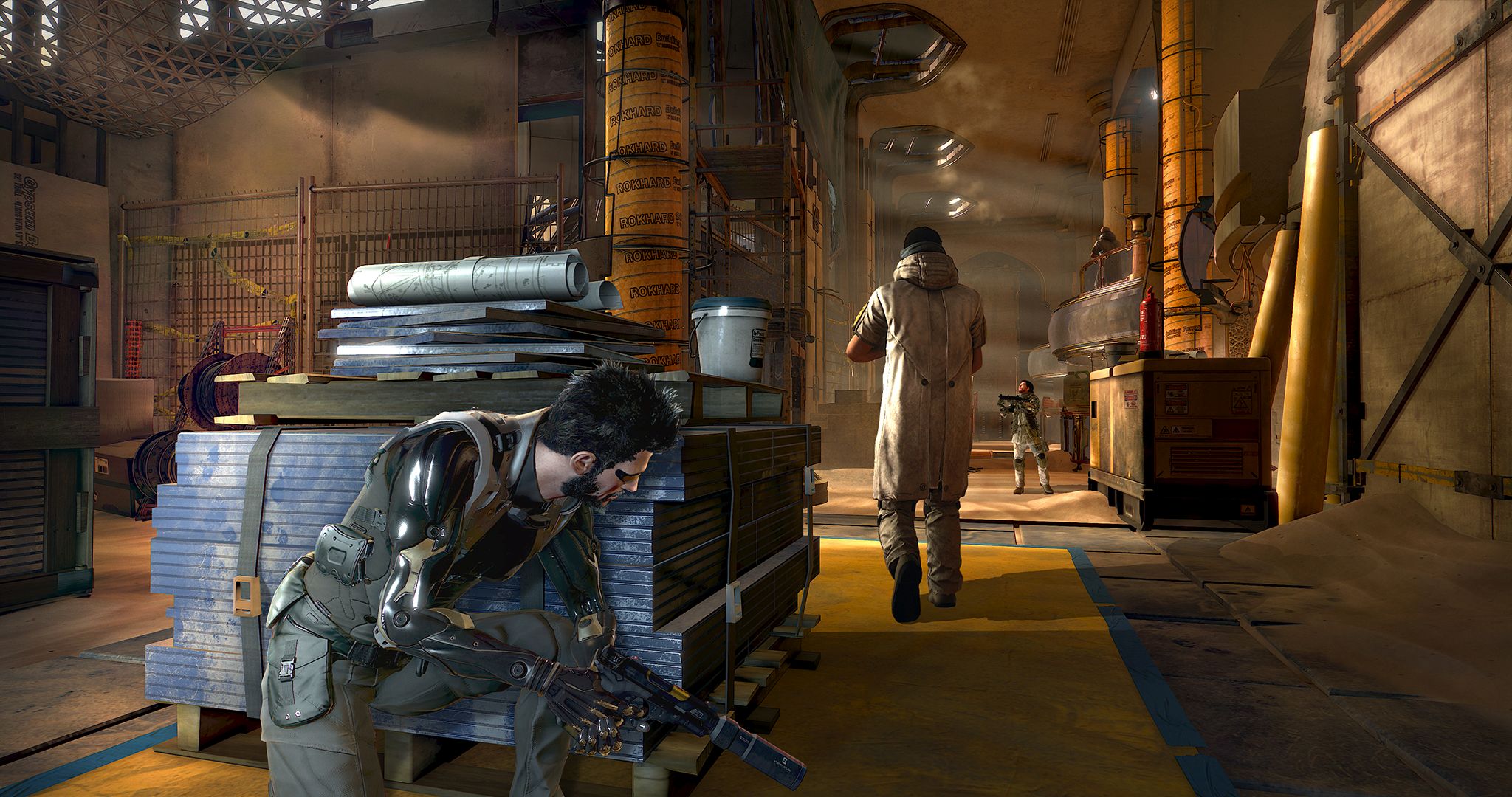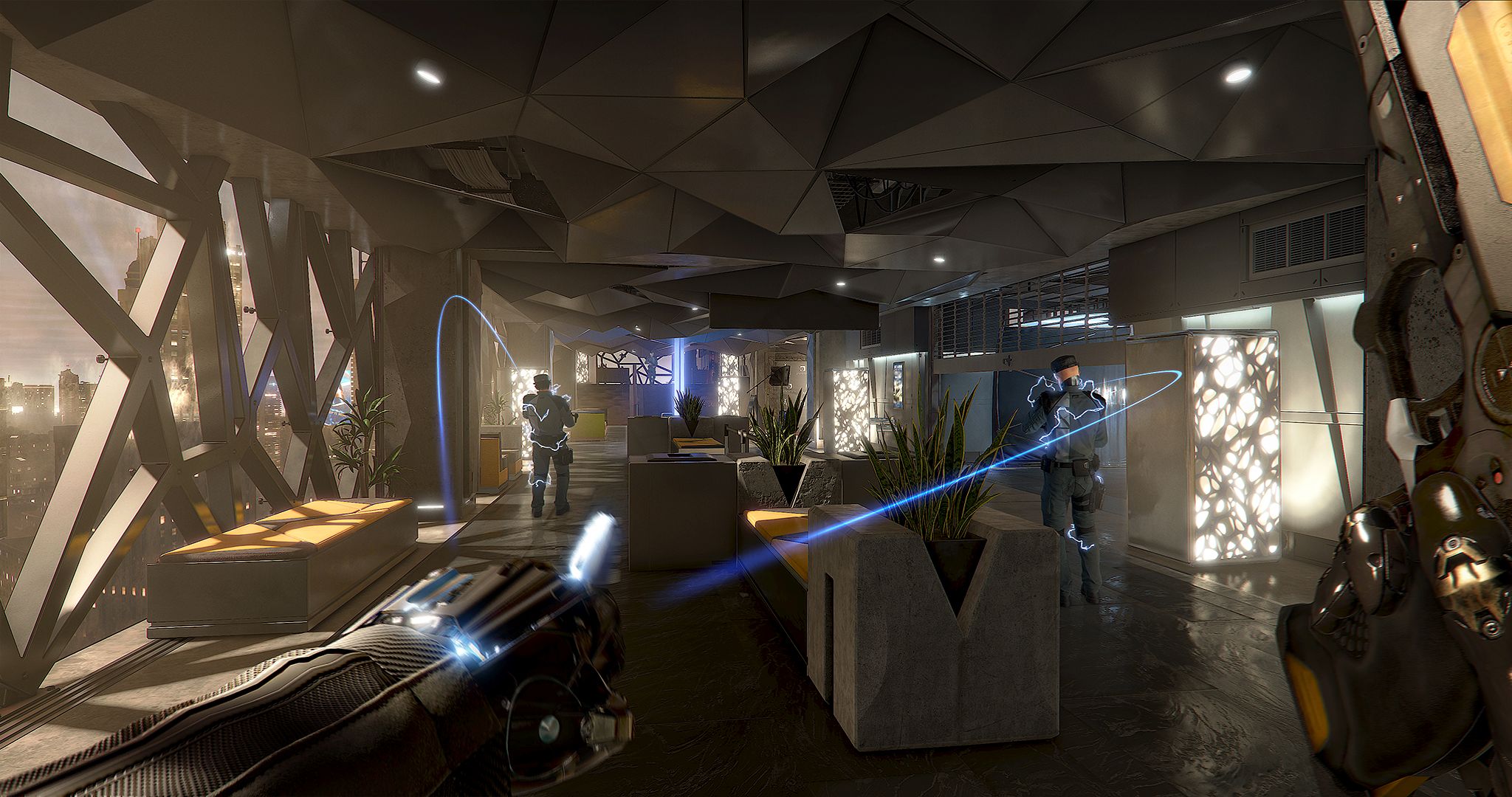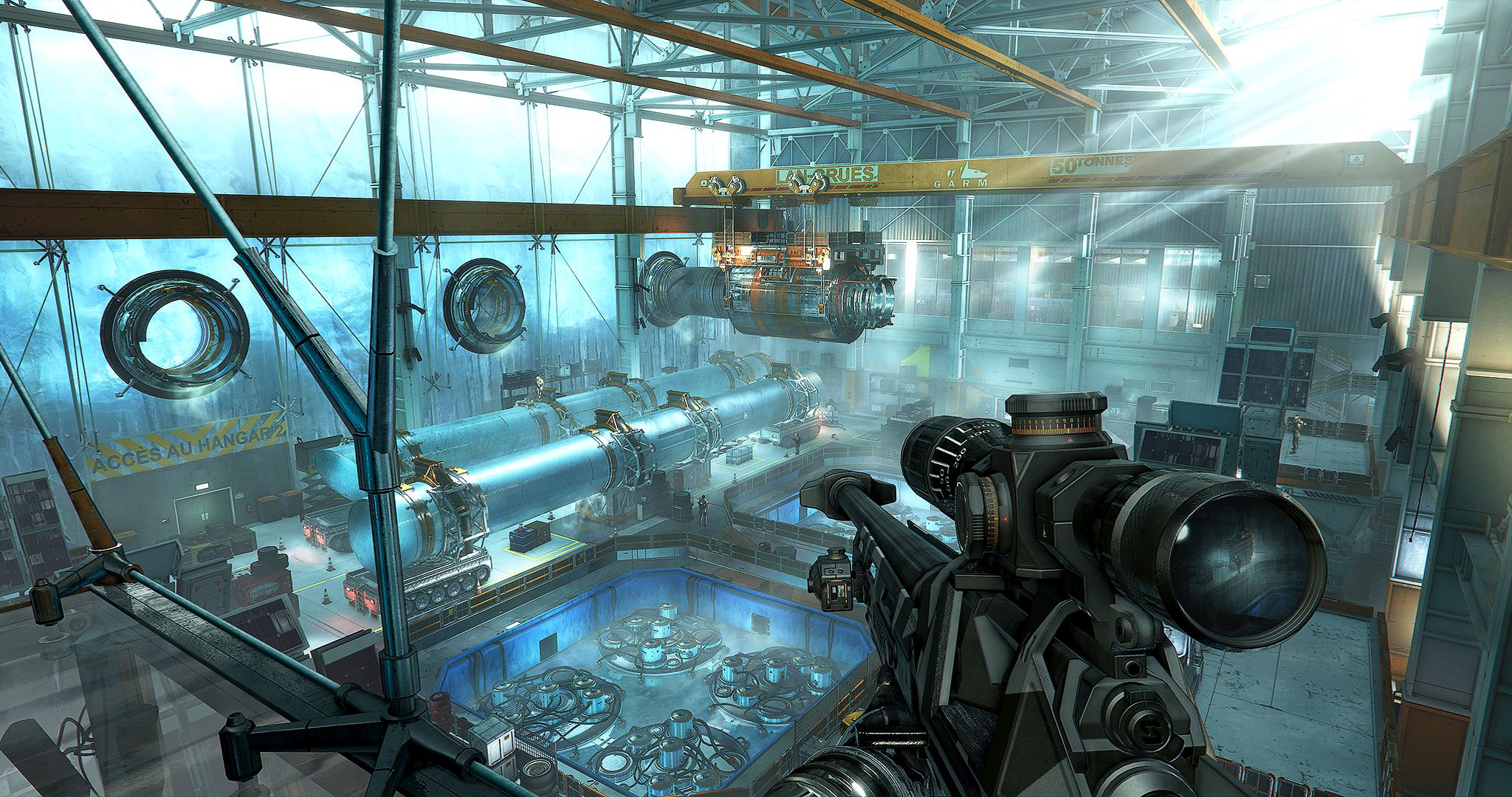Taking on the slums with new augs in Deus Ex: Mankind Divided
Eight hours with Eidos Montreal's cyberpunk thriller.

Thinking back to the Typhoon’s added flexibility, that ‘lasting decision’ theme runs throughout the game. Unlike the previous games, you’re not going to get given a hyperbolic choice at the game’s end—‘Should I become god or let someone else become god?’ Rather, like Bioshock or Dishonored, your actions during the plot determine which of the many endings you’ll get.
Similarly, your decision at the end of the last game is pretty much irrelevant (spoiler alert for Human Revolution). “We very much wanted to track your save game and start from there” says DeMarle “but we switched engines, so we weren’t able to do that.” Instead, the story goes that whatever you chose to broadcast at the end of the last game, almost no-one heard it. Given the overwhelming tragedy of the Aug incident (where every augmented human on the planet was driven into a killing spree), people simply weren’t listening.
I'm not allowed to talk about the story of the eight hours I played in too much detail, but we can talk more widely. Exploring Prague feels like the original Deus Ex, as you gradually move from Prague itself, to the augmented ghetto of Golem City, and deeper into The Throat, and the architecture changes from elegant 19th century buildings to a scrap metal slum to a great industrial facility. See more of the slums in James' video account of his time with the game.
Prague itself is a hub like Detroit in the first game. (You can see some footage of it here). It’s big enough that it needs several underground railway stops, and every area is packed with hidden information and secrets. For example, in Jensen’s apartment block alone, there’s a group of arms dealers, a living god asleep whilst a cult worships him, several hard-to-reach flats packed with goodies and hackable computers, and some drug dealers who’ve offended the local crime syndicate. Hell, in Jensen’s flat, there are secret compartments galore and a TV that lets him call his former boss David Sarif whenever you fancy. Oh, and a lot of alcohol.
Start climbing and the other apartments in Jensen’s block might be empty of people, but true to Deus Ex there’s ways and means to sneak into them. And they’re packed with story. Indeed, DeMarle tells me that there was a level designer who was solely devoted to environmental storytelling in the city hubs. “She’d work with artists to decorate these (flats) to tell these stories, and later work with the narrative team to craft these stories… the environmental stories are akin to writing poetry—you’re just putting in glimpses through emails and it’s the reader’s responsibility to connect the dots and make up their own story.”
Go lower, into the sewers and there are environmental puzzles involving electricity and poisonous gases. There are augs hiding out from the cops. There are shortcuts and secret entrances to half the buildings in the city. And, at the far end of one sewer pipe, there’s even a group of mesmerised people led by a persuasive man called Richard and surrounded by even more persuasive turrets.
“The side quests are made to be scalable, depending on your choices.” says DeMarle. Though I've been asked not to spoil any of the quests, I can see that expansiveness in the ones I completed. At several points in each quest chain, Jensen is given a chance to back out of further commitment, perhaps to solve the problem by violence or money—or even just walk away and leave them unresolved. “Or you can go farther and each step along the way, based on your choices, it can expand and introduce new characters, who might come back later.”
Keep up to date with the most important stories and the best deals, as picked by the PC Gamer team.

That means some of the sidequests have scripts that are more than a hundred pages long. “That's what I find great about this game,” says DeMarle “that we've got over a hundred page script, but you might only get ten pages of it, which is wild. And that's only the dialogues, which you then support with the written text, any emails... there's quite a bit.”
Once Jensen’s done with Prague, the plot moves him into a ghetto for the augmented, called Golem City. This place is cramped, small and messier than the classical buildings of Prague. It’s heavily patrolled by the police, who are oppressing the trapped augs quite horribly, but who have no real power in the slum.
The problem, as DeMarle puts it, is that Jensen is “a fish out of water wherever he goes.” In Prague, the augs are being portrayed as terrorists, and in Golem City he has to go in undercover. But compared to the broken down augs of Golem, he’s “too shiny, not one of us, you don’t belong here.” Standing out is not an advantage.
Suffice to say that the industrial area inside Golem City called The Throat feels like a tribute to the first level of the original Deus Ex, set on the Statue of Liberty. Here, you’re attempting to bring the leader of a seemingly-terrorist organisation to heel, and there are many routes to him, through a heavily-guarded and very vertical building.

By the time I’d got to The Throat, I’d only killed one group of people—my friendly neighbourhood arms dealer and his bodyguards—which meant I was rather heavily tooled-up. (Another unusual change in the game is that merchants have all the items they’re selling to you with them, normally locked in storage—so if you want to steal them and you’re okay with the moral consequences, you can.)
That proved to be lucky because The Throat was where my pacifist plan came apart. On my way there, I’d used up most of my tranquiliser ammo, leaving me with a handful of tranquiliser shots, the Tesla weapon, and a pair of gas grenades. And an automatic combat shotgun and a battle rifle.
I took down many of the augmented enemies quickly and stealthily with the Tesla and tranq rifle, but as soon as I was spotted the others flanked and chased me. I was forced backwards to higher ground, until I was trapped against a wall. Though Adam’s non-lethal close combat attack is extremely effective, it uses up his biocell power, meaning it can only be done every ten seconds or so—meaning I eventually had to pull out the automatic shotgun, much to my regret. My playthrough ended there, my morals abandoned, in a last stand in the centre of augmented Prague.
From what I played, Mankind Divided is exactly the sequel we’ve been waiting for. Its narrative depth and richness is necessary for an RPG in a post Witcher 3 world, as are the changes to Deus Ex that make toe-to-toe combat a viable alternative route. With them, we may be united in its praise.

